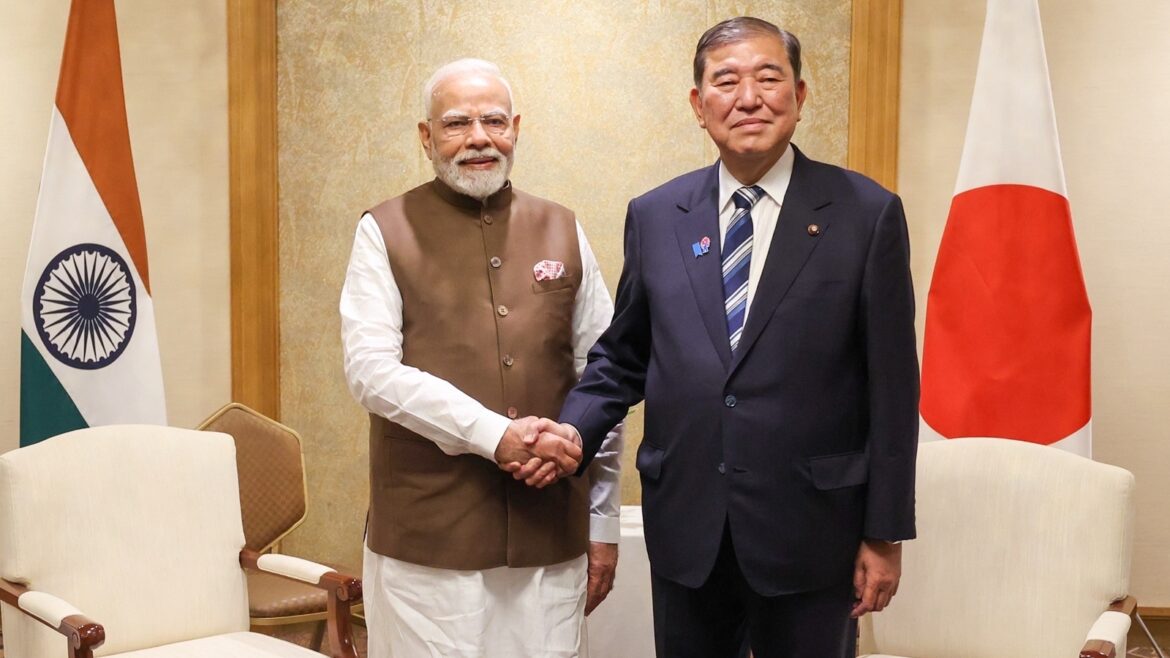Prime Minister Narendra Modi’s recent visit to Japan reaffirmed the enduring partnership between our two nations. It deepened mutual trust and cooperation and charted a vision of a partnership designed to last for decades. The spirit of this visit was heralded in Gujarat a few days earlier, when PM Modi inaugurated Maruti Suzuki’s first Made-in-India global strategic Battery Electric Vehicle production line in Hansalpur on August 26. He reminded us that our partnership is rooted in culture, and decades of collaboration. Companies like Maruti Suzuki have become “brand ambassadors of ‘Make in India’”, continuing to strengthen the foundation of “Viksit Bharat 2047”.
PM Modi’s visit to Japan took place at a critical juncture for both India and Japan. Amid today’s geopolitical volatility, our partnership is not just desirable but indispensable. Among the most significant outcomes of the visit was the transformation of our “Special Strategic and Global Partnership” into one that is truly strategic in substance: There are no areas where our two countries cannot cooperate.
During the two-day visit, PM Modi and Prime Minister Shigeru Ishiba delved into a wide range of areas — from defence and security to business cooperation, from cutting-edge technology and innovation to people-to-people exchange. The visit embodied the breadth and depth of our bilateral cooperation and highlighted the importance of Japan as India’s trusted strategic partner.
The visit also paved the way for what Prime Minister Modi called “a golden chapter” in our relationship. The two leaders issued five leader-level documents and recognised over 180 Memorandums of Cooperation (MoCs), setting out a roadmap for future cooperation and announcing concrete initiatives across fields. These tangible outcomes, in PM Modi’s words, “built a strong foundation for a new golden chapter” in the India–Japan partnership, signalling renewed momentum in our ties.
Another highlight was the visit to Miyagi Prefecture. The two leaders travelled by Shinkansen, Japan’s iconic bullet train, underscoring its role as a flagship India–Japan project aimed at bringing the Shinkansen to Indian soil. At Tokyo Electron Miyagi Ltd, a leading semiconductor company, they witnessed its advanced manufacturing capabilities and collaborative projects with India. These moments illustrated the growing significance of India–Japan cooperation in critical technologies and industries where our partnership can deliver transformative results.
Looking ahead, there are five areas where sustained effort is particularly needed, among others. First, economic security: Under the new “Economic Security Initiative,” we must accelerate collaboration in areas such as semiconductors, critical minerals, AI, and supply chains.
Second, Micro, Small and Medium Enterprises (MSMEs): Japanese MSMEs are key to accelerating “Make in India, Make for the World”. Japan remains committed to supporting them as our two countries work toward the new 10-trillion-yen (approx. $68 billion) investment target and continued improvement of the business environment. India-Japan cooperation extends beyond central governments, encompassing a multifaceted partnership including business collaboration and state–prefectural exchanges.
Third, defence equipment: The “Joint Declaration on Security Cooperation” was revised for the first time in 17 years, reflecting the rapidly changing geopolitical landscape, strengthened security dialogues, and expanded joint exercises. Based on the revised declaration, we will intensify cooperation on defence equipment and technology transfer, developing projects to follow UNICORN (naval unified complex radio antenna).
Fourth, people-to-people exchange: The two leaders announced the “Japan–India Human Resource Exchange Initiative,” which sets a new target for people-to-people exchanges to promote the development, exchange, and circulation of mutually complementary human resources between our two countries.
Fifth, multilateral and minilateral cooperation: Our close partnership in the international arena — as nations sharing fundamental values and interests — plays a critical role in addressing global challenges. Japan fully supports India’s hosting of the Quad Summit to promote peace, stability, and prosperity in the Indo-Pacific region, and will continue working alongside India in multilateral fora such as the G20, the United Nations, and global counterterrorism efforts.
PM Modi’s visit to Japan reminded us that the India–Japan partnership has never been as crucial as it is today. Looking ahead to the 75th anniversary of diplomatic relations in 2027, we are celebrating September and October as “Japan Month,” with events that promote India–Japan ties. This year also marks the Japan–India Science, Technology, and Innovation Exchange Year. These initiatives bring the people of our two countries even closer and strengthen our strategic partnership.
As we embark on this new golden chapter, I am confident that our cooperation will not only strengthen our nations but also shape the future of the Indo-Pacific and the wider world.
The writer is ambassador of Japan to India



AloJapan.com